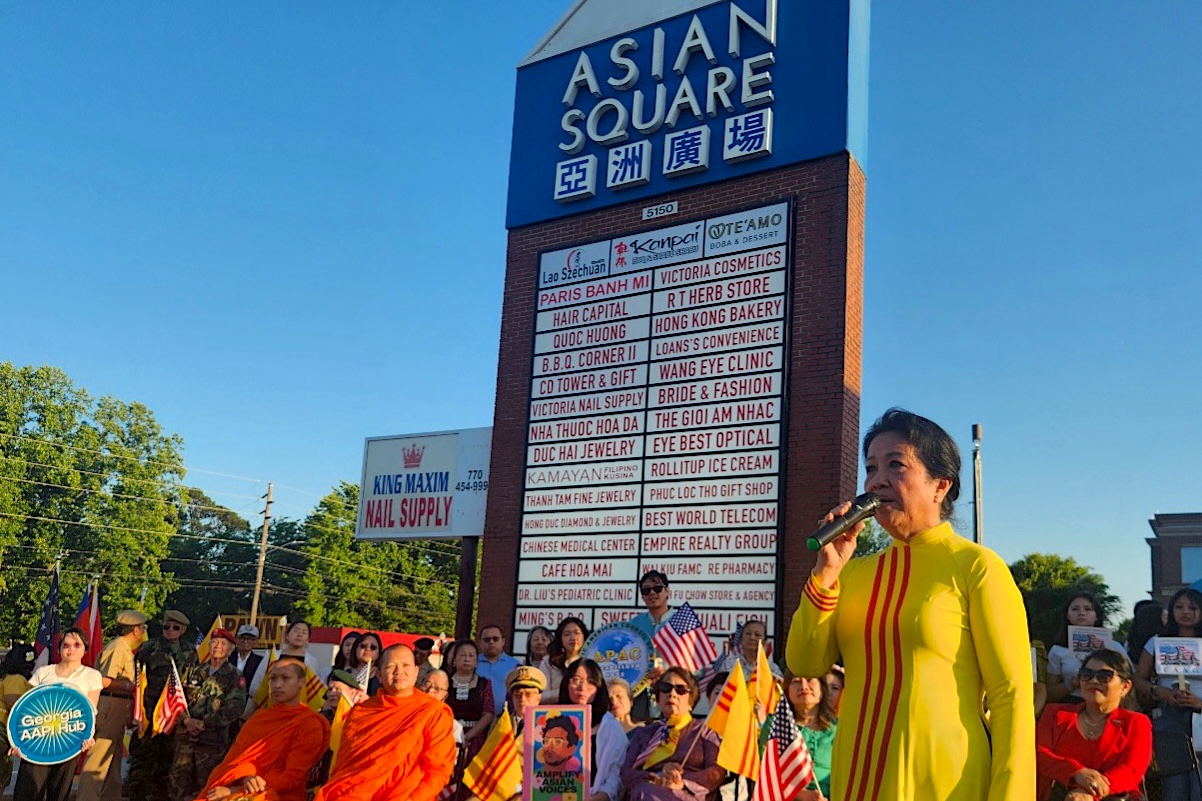DORAVILLE, Ga. – On the 50th anniversary of the fall of Saigon, Southeast Asian immigrants in Georgia are calling for more opportunities for refugees.
The Vietnamese, Cambodian, Laotian and Hmong communities gathered on May 23 at Asian Square on Buford Highway in Doraville, Georgia to commemorate the 50th anniversary of the 1975 Indochina Migration and Refugee Assistance Act.
Noy Bozarth of the Laotian American Society of Georgia still remembers the names of the American couple who sponsored her family as refugees in 1979, Mr. and Mrs. McLean of the First Baptist Church. Bozarth and her three siblings fled the war in 1975, spending four years in refugee camps in Laos and later Thailand. In 1979, they were finally admitted as refugees and resettled in Sarasota, Florida.
“Fifty years later, I have worked for a major corporation for over 30 years and have a beautiful family. We are proud to give back to the community that welcomed us. I am deeply grateful for the opportunity made possible by the Indochina Migration and Refugee Assistance Act,” said Bozarth.
The Indochina Migration and Refugee Assistance Act was signed into law 50 years ago on May 23, 1975, by President Gerald Ford. The fall of Saigon in 1975 and the end of the Vietnam War led to mass refugee displacement from Vietnam. In addition to Vietnamese refugees, the act helped resettle 130,000 Southeast Asian refugees from Cambodia’s Killing Fields, the Laotian diaspora, and other conflicts in Southeast Asia.
“The Indochina Migration and Refugee Act marked the beginning of one the largest refugee migrations in U.S. history,” noted Victoria Huynh, founder of the non-profit Georgia AAPI Hub and a former White House AAPI Commissioner under the Biden Administration.
Monica Nuth, president of the Cambodian American Association of Georgia, was born in the Peach State but grew up learning of her parents’ refugee experience. In 1975, Cambodia’s then dictatorial leader, Pol Pot destroyed the Kingdom of Cambodia, captured Phnom Penh, and massacred two million people. Her parents fled in 1979, crossing the Thailand-Cambodia border and eventually making it to Georgia in September 1986.
More than 40 years later, Nuth is now an IT project manager at a major consulting firm. “I never forget that I am a proud child of Khmer refugees. We are survivors who are resilient and we are grateful to Georgia for our home and stability over the years,” she said.
According to Long Tran, many refugees at the time looked to Georgia, and specifically to Hunter Army Airfield in Savannah, where South Vietnamese soldiers trained before returning to Vietnam to fight in the war.
Tran, who was elected to the Georgia House of Representatives in 2023, vividly remembers his own parents arriving in Georgia with nothing but grocery bags. But they rolled up their sleeves, built small businesses, and raised their children to become valuable members of the community.
“So many refugees and immigrants were in limbo” after the war, said Tran, adding passage of the Indochina Migration and Refugee Assistance Act “gave us a chance to become legal residents and eventually US citizens.”
Fifty years later, Georgia is the center of the Asian community in the Deep South. Asian Americans make up 4.5 percent of the state’s population, while the Georgia Assembly counts 11 current Asian American lawmakers.
“It’s really amazing to see the son of Southeast Asian refugees as an elected official” Tran said.
Lily Pabian, executive director of the non-profit We Love Buford Highway, is grateful for the opportunities refugees have been given. “You will find reminders of how much can be accomplished when people are given the chance not just to survive, but to thrive. We are proud to say this is what resilience looks like. This is what legacy looks like.”
The Indochina Migration and Refugee Assistance Act was later reformed following passage of the Refugee Act of 1980, which officially codified the United Nation’s definition of a refugee into U.S. law while increasing annual refugee admissions and streamlining resettlement programs.
That began to change following the attacks of 9/11 in 2001, with new security measures and greater scrutiny leading to a drop in refugee arrivals. The Trump Administration is now seeking to further tighten restrictions while stripping temporary legal status from thousands already in the country.
Officials are also considering regulations that would prohibit asylum seekers from gaining work permits as part of a broader campaign to close off America’s borders to most immigrants and refugees.
Huynh and others in Georgia’s immigrant and refugee community are putting out an altogether different message.
“We stand in solidarity with the new Americans, our refugee brothers and sisters, aunts and uncles who are just beginning their journeys here in America,” said Huynh, adding, “We remember where we came from, and we know what it means to be welcomed.”




